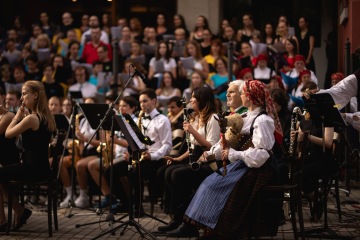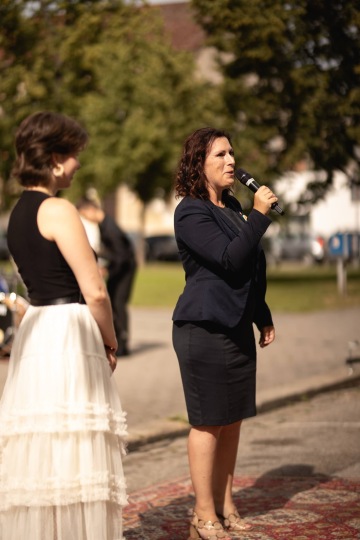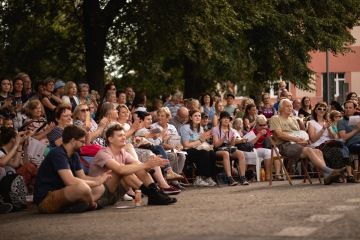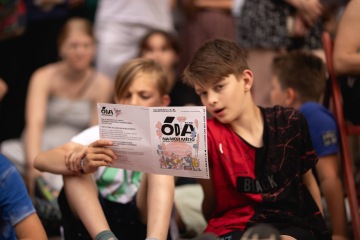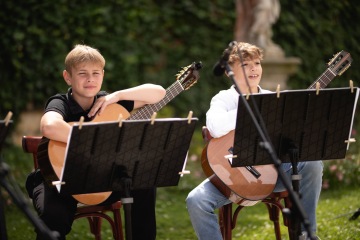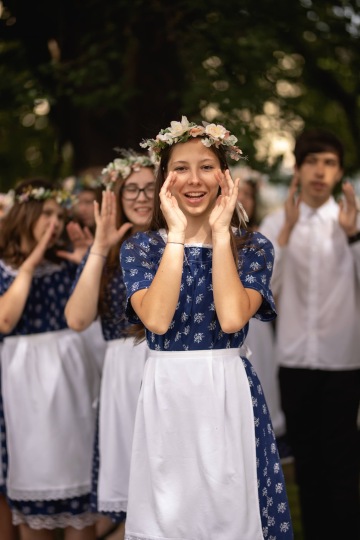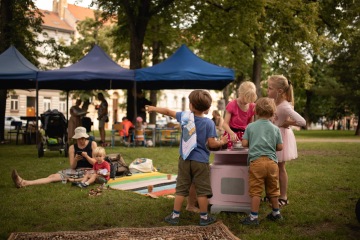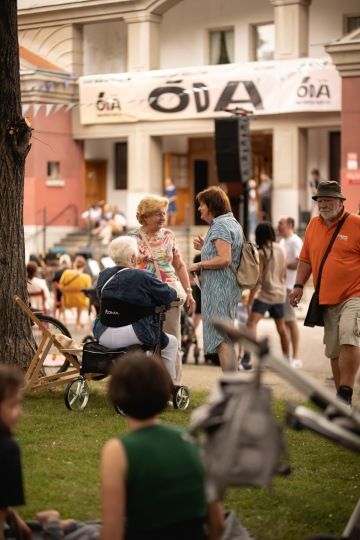ODE TO MY CITY: THE BIGGEST JOINT CONCERT IN THE HISTORY OF BUDĚJOVICE
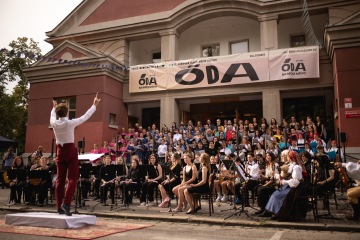
On Thursday, June 20th, České Budějovice witnessed a unique event: the park on Palackého Square echoed with the sounds of nearly 200 musicians and hundreds of spectators from all generations. After months of preparation, they came together for the first and last time in a unique ensemble to perform a new original song about our city.
How did the concert itself unfold?
👇Check out the video below👇
CZ
Zraky celé Evropy se
k Budějicům stáčejí,
zazpívejte s námi píseň
o kráse a naději.
Bez naděje a kultury
dá se sotva dobře žít,
teď můžeme věci měnit,
a ne o nich jenom snít.
Diváci opakují:
Bez naděje a kultury
dá se sotva dobře žít,
teď můžeme věci měnit,
a ne o nich jenom snít.
Kde jsou všichni ti, co řekli,
že by tu chtěl žít každý?
Zbyli jsme tu jenom my,
tak smiř se tím,
jó, smiř se s tím.
Jih je hrotem našich srdcí,
jih je přece hrotem Čech,
pojedeš-li směrem na Linz,
nehroť nic, přijď na škopek.
Diváci opakují:
Jih je hrotem našich srdcí,
jih je přece hrotem Čech,
pojedeš-li směrem na Linz,
nehroť nic, přijď na škopek.
Každou hodinu, v tu celou,
slyšı́me melodii,
jíž pro duši osamělou
spousta zvonků odbíjí.
Vedle Samson hrdě stříká,
kašnu střeží den co den,
jen občas si zanařı́ká,
holubem jsa pokropen.
Náměstí, co suchou nohou
i v lijáku překonáš,
zasluhuje chválu mnohou,
je to štít a klenot náš.
Na ostrově Sokoláku
mladý párek ztroskotal,
v objetí pak za soumraku
v bazénu si plují dál.
Kdyby Karel Hynek Mácha
napsal dnes svou báseň Máj,
Vilém by si dával bacha,
sídliště by obýval.
Tiše by pak záviděly
Šumava i Vltava,
poslušně se odtud hlásí
Švejk Haška Jaroslava.
Kdyby ten král P. O. druhý
viděl, co tu založil,
litoval by, že je tuhý,
že se toho nedožil.
Proudy lidí proudí podél Malše,
když jdou z Motoru,
ať už z výher nebo z proher,
vždy se daj do hovoru.
U Šebestů ve tři ráno
poručí si svíčkovou,
ani ty, má drahá mámo,
neuvaříš takovou.
Kde jsou všichni ti, co řekli,
že by tu chtěl žít každý?
Zbyli jsme tu jenom my,
tak smiř se tím,
jó, smiř se s tím.
Jih je hrotem našich srdcí,
jih je přece hrotem Čech,
pojedeš-li směrem na Linz,
nehroť nic, přijď na škopek.
Praha chtěla chobotnici,
my mohli mít rejnoka,
bohužel jsme na palici,
nepadly nám do oka.
Kdo se na nás za to zlobí,
kdo nad námi láme hůl,
ať neláme tuhu, prosím,
těm našim Koh-i-noorům.
Spíš se ptejte: na pikador
a na selský baroko,
na prvního českýho kosmonauta,
a jak osleplo rameno…
Až čtrnáctiletým nosům
bude těch let osmnáct,
letopočet dvacet osm
mocně vtrhne mezi nás.
Až dojdeme k tomu číslu,
město zažije ten šok
v pozitivním slova smyslu,
kultura má držet krok!
Author of the lyrics: Štěpán Hebík
In collaboration with composer Mikoláš Troup and with contributions from Vít Pískala.
What were the first impressions of the audience after the performance of Ode to My City?
"I'll try to capture the experience in a few words: joy, life, summer. It really uplifted me today. It's nice that in this neighborhood and in this park, it feels like this!"
- Tereza Milota Mitošinková
"I really enjoyed it; it was clear that all the choirs and musicians were having a great time. I love the idea of bringing everyone together like this, and the result felt professional!"
– Bára Paulátová
"I was thrilled by the strength of the musicians. I had goosebumps when they were singing. I felt the power of all the people from Budějovice behind it. It’s worth dedicating oneself to the arts; it's a wonderful tool for connecting people and supporting the life and beauty that surrounds us here."
– Eva Hajduková
– Ivan Červenka
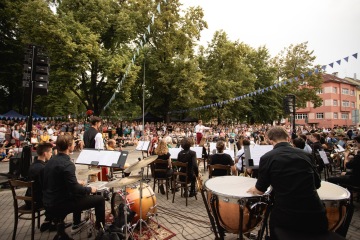
Curator Ondřej Horák comments on the entire event:
“It was a challenge to transform our initial vision into a concert that would appeal to a broad audience. We’ve been working on the Ode for six months, and during that time, everything has incredibly evolved. From the initial idea—which seemed quite daring—to the first meetings with the creators and the first joint rehearsals of the orchestra and choirs. I was surprised by the strong willingness to get involved. We didn’t have to persuade anyone—from the composers and lyricists to all the performers. Moreover, we received excellent support at Palackého Square with the local church providing great facilities.”
Who Was Involved and What Do They Say About the Shared Experience?
Lucie Boušková from the European Capital of Culture 2028 team:
170 performers is an impressive number. Who all participated in the Ode?
"We reached out to various musical institutions and choirs. In total, 16 choirs, ensembles, organizations, and groups were involved. The Ode is the result of a collaboration between the creative team and institutions such as the Conservatory, the ZUŠ on Piaristické Square, ZUŠ B. Jeremiáš on Palackého Square, the Jitřenka choir, BIGYsbor from the Bishop’s Gymnasium, the Choir "Z" from Gymnázium Česká, the Choir Project, Klub Aktiv - Singing for Joy, the Abwun Chamber Choir, and the South Bohemian Folklore Ensemble Úsvit. Additionally, a few enthusiastic individuals from various musical sections and groups joined in. This brought together ensembles and musicians who had never performed together before."
It’s a very diverse group. Was it planned to involve both professionals and amateurs?
"That was indeed the goal! For example, for the children’s school choirs, it was a unique opportunity to experience working with a professional conductor and music composer. The aim of Ku.turista is to allow all residents to participate in the European Capital of Culture program and be part of something larger."
What other musical programs could the audience enjoy besides the Ode itself?
"The musical walk guided people from the city center to the park on Palackého Square with seven stops featuring small concerts. Additional bands performed at Palackého Square in collaboration with the Music Festival, which was also taking place in the city on Thursday. Visitors also had the chance to participate in workshops led by Klára Boudalová, where they made their own musical instruments and composed their own South Bohemian folk music."
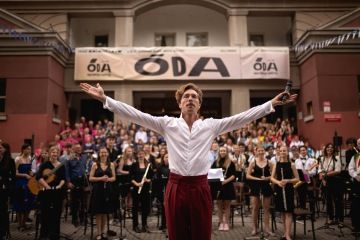
Patrik Červák, conductor of the ensemble and guest conductor with the South Bohemian Philharmonic
It all sounds like an experiment—how did the idea evolve under your direction?
"Quite dramatically. I got involved in the project when Lucie Bílková from the European Capital of Culture team called me in January to ask if I would participate as a kind of musical supervisor and eventually as the conductor. At that time, the idea of what I would actually be directing was still quite vague. The initial concept changed in March when composer Mikoláš Troup joined the project, and then again in April when musician Štěpán Hebík came on board as the lyricist. And then once more in May when Mikoláš completed the composition and we saw the result. But the result on paper is still far from the final sound. So, I was curious myself to see how it would turn out today."
What was it like working with such a large and diverse musical ensemble?
“Diverse” is a bit misleading. When there is a willingness from both the orchestra and the choirs to give their best in rehearsals and at the concert, any lack of cohesion fades away because everyone is truly trying to do what I ask. And as a conductor, I aim for us to be a unified entity. I believe we achieved that today!"
Štěpán Hebík, lyricist, musician known as 7krát3, and Anděl award winner
What inspired you while writing the lyrics?
"The initial idea that came to mind revolves around a phrase I hear whenever I travel outside of Budějovice: “Everyone would like to live in Budějovice.” And I ask, where are all those people who say that? If it were true, Budějovice would have to have ten million inhabitants. But that’s not the case. It’s just us—Budějčáci—left here. So, we have to accept this with a smile, as do those who don’t live here. :)
What is your favorite thing about České Budějovice?
"In today’s world, it’s important to highlight that we live in peace here and don't face some of the pressing problems seen in other cities around the world. I’ve always appreciated that in our city, everything is within walking distance, which gives a pleasant sense of freedom. I don’t have one favorite thing. Affection for things grows with time. It’s wonderful when someone appears in our small city who brings something new and useful—whether it’s art, architecture, job opportunities, or business. I believe our city needs such natural cultivation. I hope that at least in part, this will succeed in 2028 in the realm of culture."
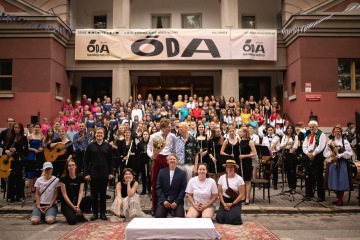
Mikoláš Troup, composer, South Bohemian Theatre
In the composition, you decided to work with the melody of the 'Ode to Joy.' Why?
"I was looking for a motif that would be universally understandable and, unlike the text full of local references, emphasize the European dimension. The melody of the 'Ode to Joy' from Beethoven’s 9th Symphony is one of the most famous melodies in musical history, and its message of unity and joy seemed ideal for a project celebrating České Budějovice as the European Capital of Culture. I wanted the melody to become a common language in the composition that would connect all the performers and the audience."
What do you want to express through the music?
"The composition should primarily be a joyful explosion of collective energy. It aims to present the city as a fertile ground for various forms of culture. Through stylistic variations of the main motif, I tried to demonstrate how diversity can become a unifying force and how completely different elements can contribute to richness and beauty."
What aspects of České Budějovice inspired you during the creation?
"I was most inspired by the text of Štěpán Hebík, which describes various facets of České Budějovice's character—from architectural to sports and dining aspects. It also subtly hints at a certain criticism of excessive conservatism and a lack of courage in embracing certain future visions that could help transform the city for future generations.
As a recognizable musical symbol of the region, I incorporated a quotation from the folk song “K Budějicum cesta,” which not only evokes a sense of belonging but also adds a playful, light-hearted, and witty element to the overall tone of the composition."
Marie Toncarová, member of the Choir Project
Why did you decide to get involved in the Ode and what has it brought you?
"We wanted to contribute to new cultural events in Budějovice and seize opportunities within the framework of the European Capital of Culture 2028. Through the Ode, we have gained new experiences and connections from working with other musicians, choirs, choir directors, conductors, and composers.
The collaboration with a trained conductor, musician, and composer was fantastic. It allowed us to perform alongside other choirs of different genres and age groups. However, we particularly valued the opportunity to work with the orchestra, which our home choir director Tomáš Kotal has been considering for some time. What was amazing was having the composer of the music arrangement lead one of the joint rehearsals of all the choirs. His explanations helped us better understand and interpret what was written in the scores, making it an inspiring and enriching experience. It broadened our horizons, and we are grateful to the whole team for this opportunity!"
What was it like to be part of the preparations and rehearsals?
"The beginning was a challenge for us. We arrived at the first joint rehearsal with other groups almost unprepared, thinking that performing the Ode to Joy would be simple since we all know it. We soon realized that the opposite was true. Seeing the prepared students from the Conservatory, ZUŠ, and the Jitřenka choir made us doubt our abilities. However, our nervousness faded when we heard the wonderful combination of choir singing with the orchestra and saw the enthusiasm of conductor Patrik Červák and composer Mikoláš Troup. This inspired us and motivated us to give our best. Some fell in love with the sound of the timpani, others with the conductor, and others with the seven-eighths rhythm. It was an unforgettable experience, and we look forward to future similar projects."
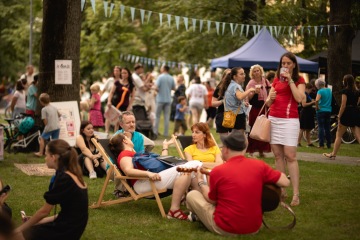
It has been almost a year since České Budějovice was awarded the title of European Capital of Culture 2028, when the international jury visited the city. "Ode to My City" was therefore both a symbolic celebration and a preview of what the city can expect leading up to 2028. According to Lucie Bílková from the European Capital of Culture team, this event is just the beginning: "The Ode was not only a playful celebration of music, the individual ensembles, and our city but also a demonstration of how we want to work. We aim to connect artists and residents, and collaboratively create experiences for the wider public. It’s an opportunity for locals to get involved in the program and become part of something unique.”
